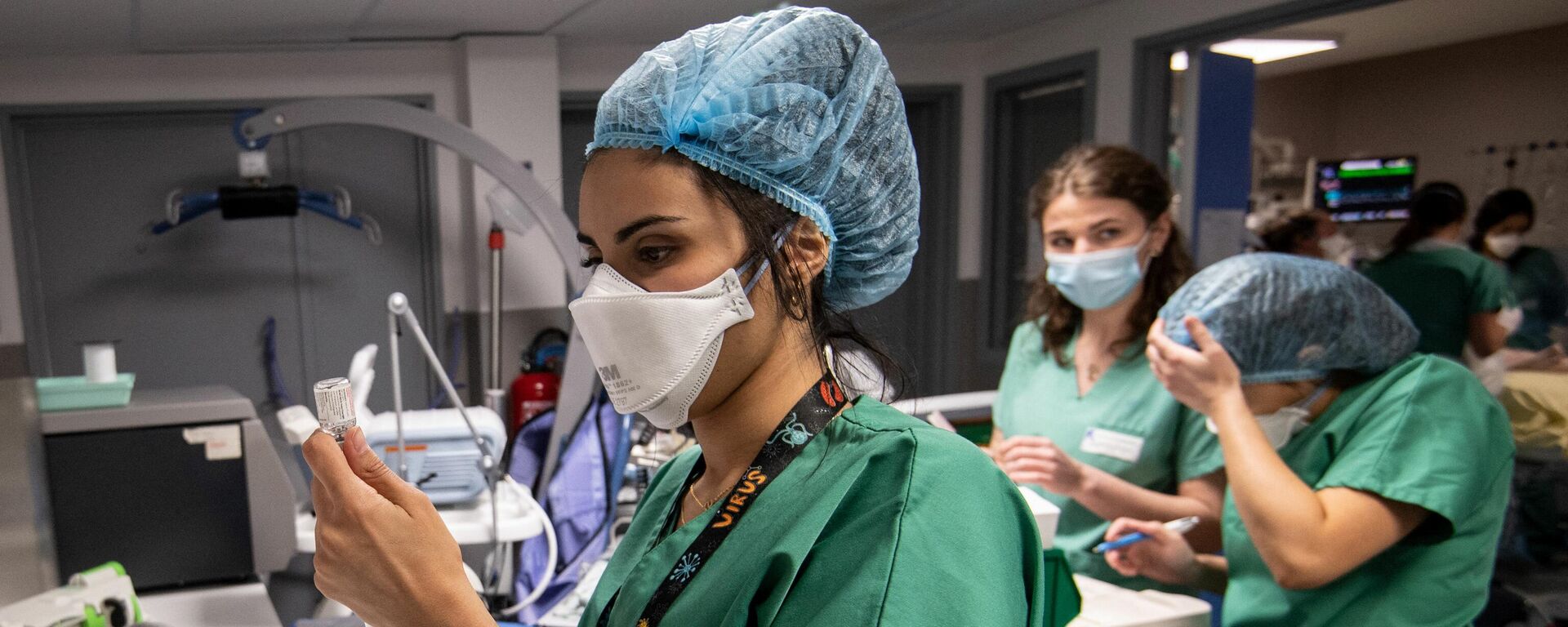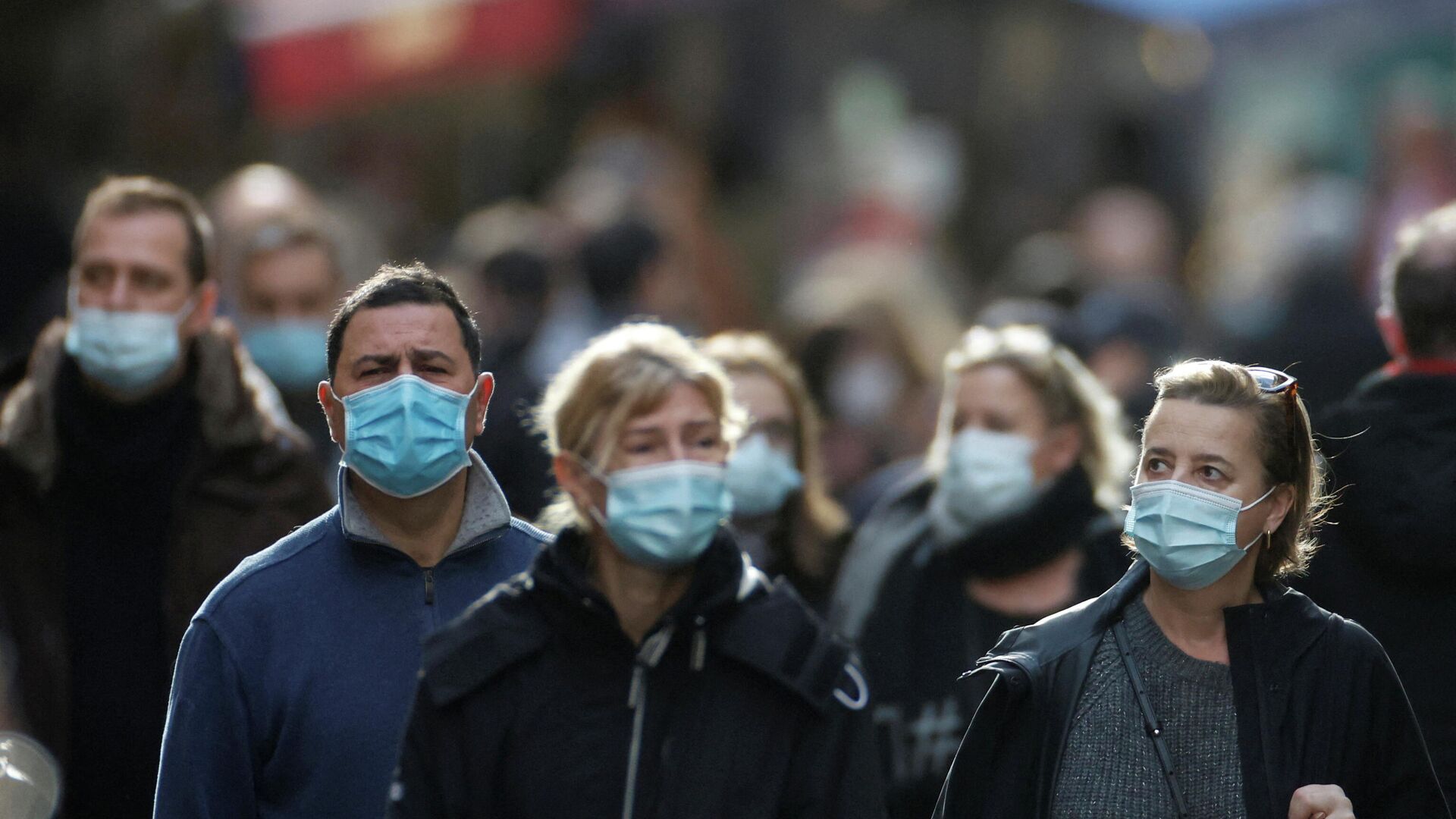https://sputnikglobe.com/20220104/worrying-new-covid-19-strain-with-46-mutations-found-in-france-may-be-more-jab-resistant-1092007731.html
‘Worrying’ New COVID-19 Strain With 46 Mutations Found in France May Be More Jab-Resistant
‘Worrying’ New COVID-19 Strain With 46 Mutations Found in France May Be More Jab-Resistant
Sputnik International
A new COVID-19 strain appears to have been found in France possessing 46 mutations believes to render it more transmittable and vaccine-resistant, according to a paper posted on medRxiv and yet to be peer-reviewed.
2022-01-04T05:28+0000
2022-01-04T05:28+0000
2022-01-04T06:17+0000
sars coronavirus
covid-19
omicron strain
france
https://cdn1.img.sputnikglobe.com/img/07e5/0c/1f/1091935621_0:161:3066:1886_1920x0_80_0_0_6aac4a35254be59d099d6714ea2c9521.jpg
A new COVID-19 strain appears to have been found in France which has 46 mutations, which is believed to render it more transmittable and vaccine-resistant, according to a paper posted on medRxiv which has yet to be peer-reviewed.The coronavirus variant, dubbed B.1.640.2., was first discovered by scientists at the Méditerranée Infection University Hospital Institute (IHU) on 10 December last year. They had announced on Twitter that they had detected the new strain in patients from Forcalquier, in the Alpes-de-Haute-Provence region.A cluster of 12 cases of a variant of “atypical combination” have been confirmed near the Marseilles area, with reports suggesting that many of those patients required hospitalisation.According to the paper, the “index case” was a fully-vaccinated man who had returned from a trip to Cameroon in November. Three days later he is said to have tested positive for the coronavirus, developing “mild respiratory symptoms”.Tests have shown that the coronavirus strain carries the E484K mutation – which, it is believed, render it more resistant to vaccines, and the N501Y mutation that was originally discovered in the Alpha variant. The latter feature may make the strain more transmissible.Analysing this “distant relative” of Omicron, scientist wrote in the publication:Omicron, or B.1.1.529, which is currently driving COVID-19 case numbers to new highs worldwide, carries around 50 mutations. It appears better able to evade immunity, but accumulating research suggests it is less likely to trigger severe disease.Underscoring the importance of testing and “genomic surveillance”, the paper dated 29 December concluded:The academics behind the publication also acknowledged that it was “too early to speculate on virological, epidemiological or clinical features of this IHU variant based on these 12 cases”.B.1.640.2. is not yet under investigation by the World Health Organisation (WHO) or a “variant of concern”. There reportedly has not been any evidence it has spread past the French border.US epidemiologist Eric Feigl-Ding took to Twitter to weigh in on the variant of “atypical combination”. He attempted to play down concerns, stressing that new strains are constantly being detected.The one aspect that he did find “worrying” was that ICU rates were seemingly far higher in the region of France where the new variant cluster is located.Imperial College London virologist Dr. Tom Peacock similarly took to Twitter to suggest that the IHU variant “actually predates Omicron”.Other experts have emphasised that since the positive samples of the strain were first detected in November, it might very well have been stamped out by the highly-transmissible Omicron variant since.
https://sputnikglobe.com/20220103/french-health-minister-expects-january-to-be-tough-for-hospitals-due-to-omicron-strain-1091996057.html
france
Sputnik International
feedback@sputniknews.com
+74956456601
MIA „Rossiya Segodnya“
2022
News
en_EN
Sputnik International
feedback@sputniknews.com
+74956456601
MIA „Rossiya Segodnya“
Sputnik International
feedback@sputniknews.com
+74956456601
MIA „Rossiya Segodnya“
covid-19 omicron france mutations
covid-19 omicron france mutations
‘Worrying’ New COVID-19 Strain With 46 Mutations Found in France May Be More Jab-Resistant
05:28 GMT 04.01.2022 (Updated: 06:17 GMT 04.01.2022) The Sars-CoV-2 virus that causes the coronavirus disease is constantly evolving in ways that make it more transmissible and enable it to infect people who should have immunity. New variants of the virus show a genetic change that differs from the original sequence when COVID-19 was identified - triggering concerns among global health experts.
A new COVID-19 strain appears to have been found in France which has 46 mutations, which is believed to render it more transmittable and vaccine-resistant, according to a paper posted on medRxiv which has yet to be peer-reviewed.
The coronavirus variant, dubbed B.1.640.2., was first discovered by scientists at the Méditerranée Infection University Hospital Institute (IHU) on 10 December last year. They had announced on Twitter that they had detected the new strain in patients from Forcalquier, in the Alpes-de-Haute-Provence region.
A cluster of 12 cases of a variant of “atypical combination” have been confirmed near the Marseilles area, with reports suggesting that many of those patients required hospitalisation.
“We indeed have several cases of this new variant in the Marseilles geographical area. We named it ‘variant IHU’. Two new genomes have just been submitted,” wrote IHU Professor Philippe Colson, the head of the department that discovered the variant.
According to the paper, the “index case” was a fully-vaccinated man who had returned from a trip to Cameroon in November. Three days later he is said to have tested positive for the coronavirus, developing “mild respiratory symptoms”.

3 January 2022, 13:03 GMT
Tests have shown that the coronavirus strain carries the E484K mutation – which, it is believed, render it more resistant to vaccines, and the N501Y mutation that was originally discovered in the Alpha variant. The latter feature may make the strain more transmissible.
Analysing this “distant relative” of Omicron, scientist wrote in the publication:
“Subsequent detection by qPCR of three mutations in the spike gene to screen for variants, as systematically performed in France in case of SARS-CoV-2 positivity, revealed an atypical combination with L452R-negativity, E484K-positivity, and E484Q-negativity … that did not correspond to the pattern of the Delta variant involved in almost all SARS-CoV-2 infections at that time.”
Omicron, or B.1.1.529, which is currently driving COVID-19 case numbers to new highs worldwide, carries around 50 mutations. It appears better able to evade immunity, but accumulating research suggests it is less likely to trigger severe disease.
Underscoring the importance of testing and “genomic surveillance”, the paper dated 29 December concluded:
“These observations show once again the unpredictability of the emergence of new SARS-CoV-2 variants and their introduction from abroad, and they exemplify the difficulty to control such introduction and subsequent spread.”
The academics behind the publication also acknowledged that it was “too early to speculate on virological, epidemiological or clinical features of this IHU variant based on these 12 cases”.
B.1.640.2. is not yet under investigation by the World Health Organisation (WHO) or a “variant of concern”. There reportedly has not been any evidence it has spread past the French border.
US epidemiologist Eric Feigl-Ding took to Twitter to weigh in on the variant of “atypical combination”. He attempted to play down concerns, stressing that new strains are constantly being detected.
The one aspect that he did find “worrying” was that ICU rates were seemingly far higher in the region of France where the new variant cluster is located.
Imperial College London virologist Dr. Tom Peacock similarly took to Twitter to suggest that the IHU variant “actually predates Omicron”.
Other experts have emphasised that since the positive samples of the strain were first detected in November, it might very well have been stamped out by the
highly-transmissible Omicron variant since.


